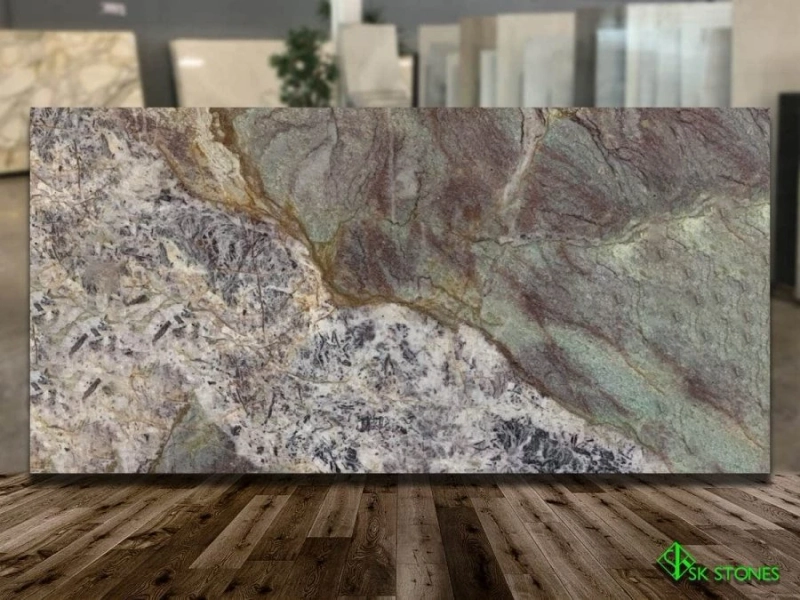Quartzite is a durable material, but it’s not indestructible. It’s important to clean spills promptly and use non-abrasive cleaners specially formulated for stone surfaces to help prevent damage.
You may need to reseal your countertops periodically. Resealing can help prevent stains and etching, and it will prolong the lifespan of your counters.
How to Maintain Your Countertops
Aside from the occasional deep clean, most homeowners can easily keep their quartzite countertops looking fresh and new by using a mild liquid soap with plenty of clean water. This is the best way to keep their counters free from stains and streaking, as well as prevent damage caused by overzealous cleaning or excessive rubbing. Avoid abrasives or other harsh chemicals that may strip protective sealants and dull the surface of your counters. You should also never use abrasive sponges or metal putty knives, as these can cause micro scratches in the surface that allow dirt to penetrate and stain.
You can further protect your countertops by keeping a few items around the house that will help you quickly remove any spills or splatters before they have time to soak in. A few of these include a sponge dampened with commercial surface cleaner, non-abrasive steel wool, and a soft-bristled brush for hard to reach spots. Avoid scrubbing the stone with a stiff-bristled brush, as this can damage the surface.
You can further enhance your counters’ resistance to stains by having them professionally sealed once per year. A natural stone installer will recommend an impregnating sealer that penetrates into the counter to provide lasting protection against stains and water damage. The sealant should be sprayed or brushed on, and you should follow the manufacturer’s instructions on how to apply it and dry it.
Stain Removal
Due to their porosity, natural stone is susceptible to stains from various liquids that penetrate the surface. This includes water based and oil based substances like coffee, tea, juices, makeup, oils and greases. Fortunately, proper cleaning, prompt stain removal and an effective sealer can mitigate most issues that may arise from improper care of your quartzite countertops.
Identifying the type of stain is crucial to addressing it. Water stains caused by condensation buildup on glasses or other items are easily eliminated with a mixture of warm water and baking soda. Organic stains such as those from food or ink from labeling leftovers can also be removed with a mixture of 12% hydrogen peroxide and baking soda paste. Simply apply the paste to the stained area, cover with plastic wrap and allow to sit for a day before wiping clean.
For deeper stains that don’t respond to standard cleaning solutions, professional stain removal services may be necessary. A professional can also recommend an appropriate type of sealer to protect your countertops and help lengthen their lifespan. Before applying a new sealer, it’s important to test out the product in an inconspicuous area following the manufacturer’s instructions. It’s also wise to have your countertop professionally resealed every three to four years in order to boost its durability and stain resistance.
Sealing
Quartzite is a durable material and can handle quite a bit of wear and tear, but if it's not sealed properly, it can be susceptible to stains, chips, and cracks. The best way to protect your countertops is with periodic sealing. This will keep the stone pristine and looking good for years to come.
When you're ready to have your counters sealed, be sure to consult a professional and get the best possible sealant for your type of quartzite. You'll also want to make sure that the surface is clean and free of any stains before applying the sealant. Otherwise, the stains will be pushed further into the pores and become permanent.
A professional will use a high-quality, penetrating sealer designed specifically for natural stone surfaces like quartzite. They'll carefully follow the manufacturer's instructions to ensure proper application and long-lasting protection. They'll recommend resealing dates based on your home's usage patterns and maintenance schedule.
Visit Website: https://skstonesusa.com/quartzite/
There are two types of sealers available for your quartzite countertops: topical and penetrating. Topical sealers create a protective barrier on top of the stone and can enhance its color and shine, but they require frequent reapplication. Penetrating sealers, on the other hand, are absorbed into the pores of the stone and offer long-lasting protection without altering the appearance. Be sure to ask your professional about the pros and cons of each option so that you can make an informed decision for your home.
Maintenance
When you regularly clean your quartzite countertops and avoid using acidic cleaners or scouring pads, stains should be fairly easy to remove. However, some stubborn stains may require a more serious approach like a poultice or mineral spirits to lift them from the stone. In such cases, you should call a professional to help you deal with them safely and effectively.
Keeping your quartzite countertops looking their best requires a comprehensive strategy that includes consistent sealing, diligent cleaning, and skillful polishing. Employing these techniques eradicates blemishes, amplifies the stone’s resplendent shine, and extends the longevity of your countertops.
For daily cleaning, use a cloth or sponge soaked in a mild liquid soap that is designed for natural stone surfaces. Be sure to rinse your countertops thoroughly afterward. Avoid cleaners containing acids, as they can etch the surface of your counters and leave them susceptible to stains.
You should also consider having your countertops resealed to help protect them from water and other liquids. It is recommended that homeowners have their countertops resealed every two years, but the frequency can vary depending on your lifestyle and usage patterns. When you’re ready to reseal your quartzite, choose an impregnating sealer that is specifically formulated for natural stone. Follow the manufacturer’s recommendations for application and curing times. Once the sealant is fully absorbed, buff it gently with a dry cloth to remove any residue.
Read More: https://writeupcafe.com/understanding-the-different-grades-of-quartz/



